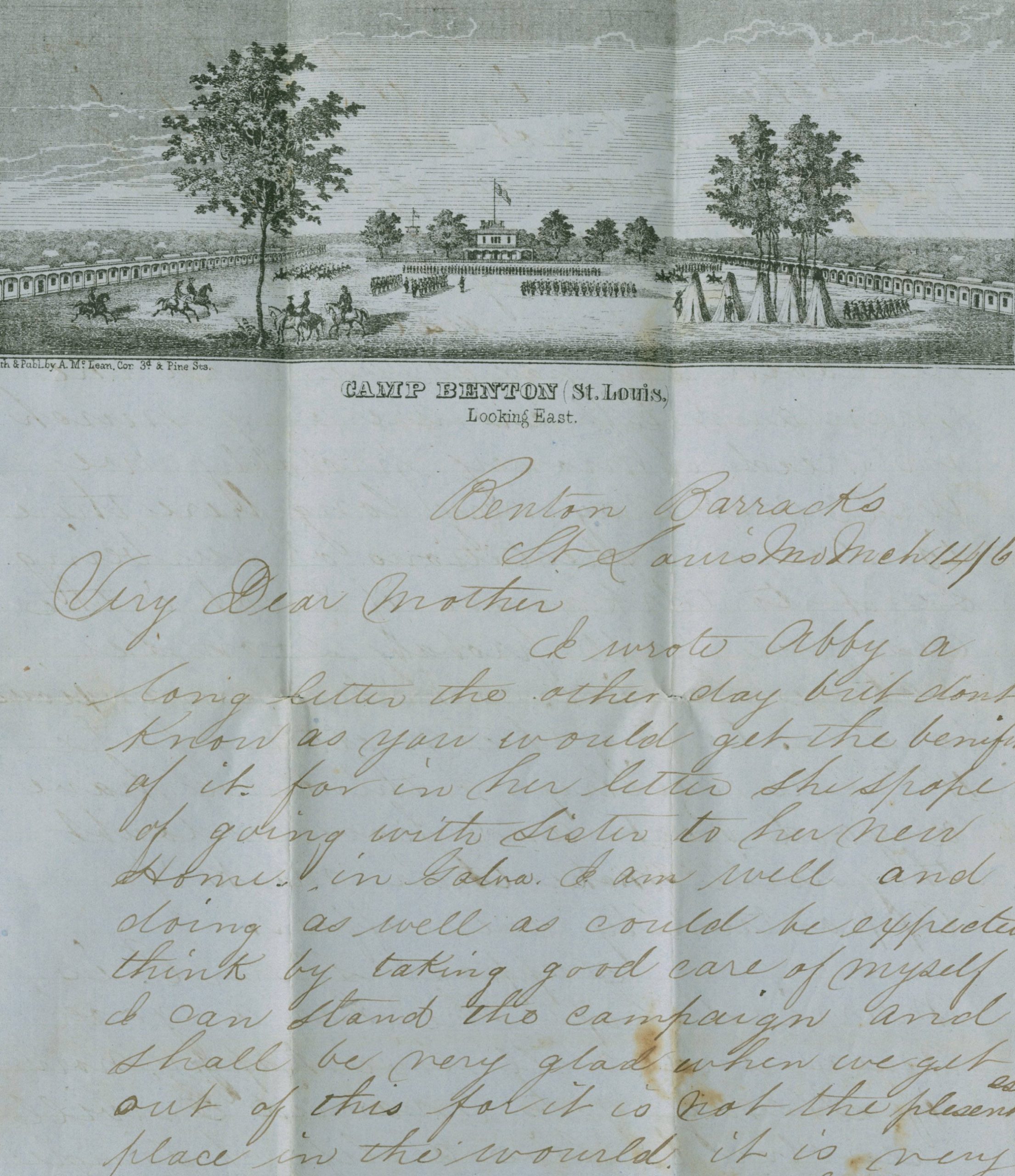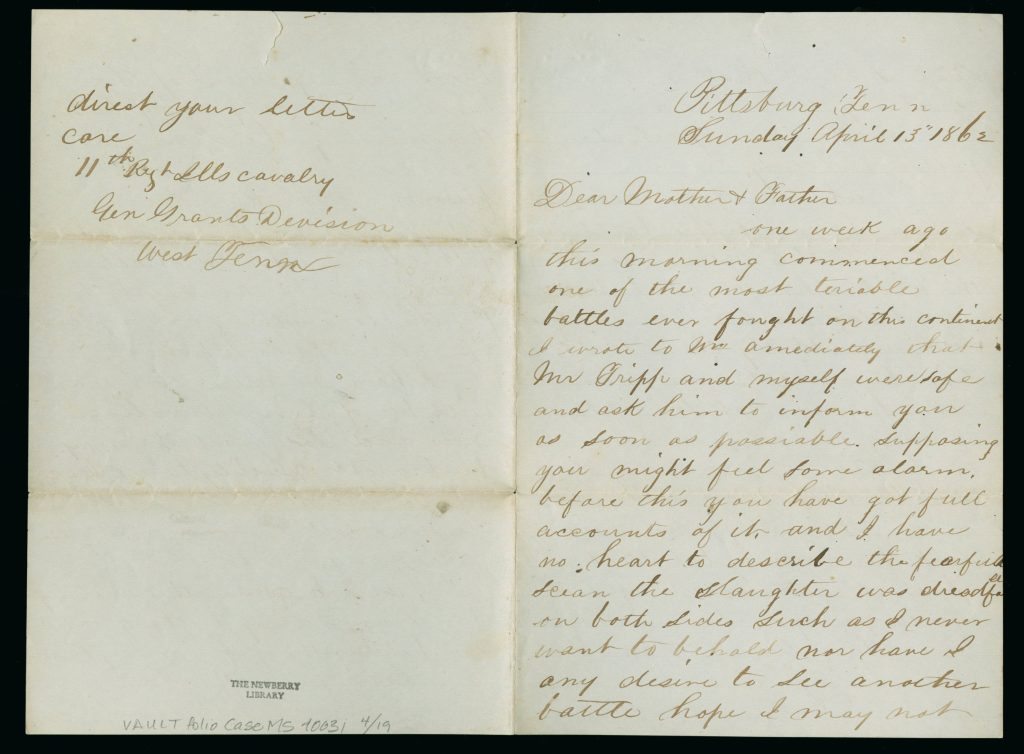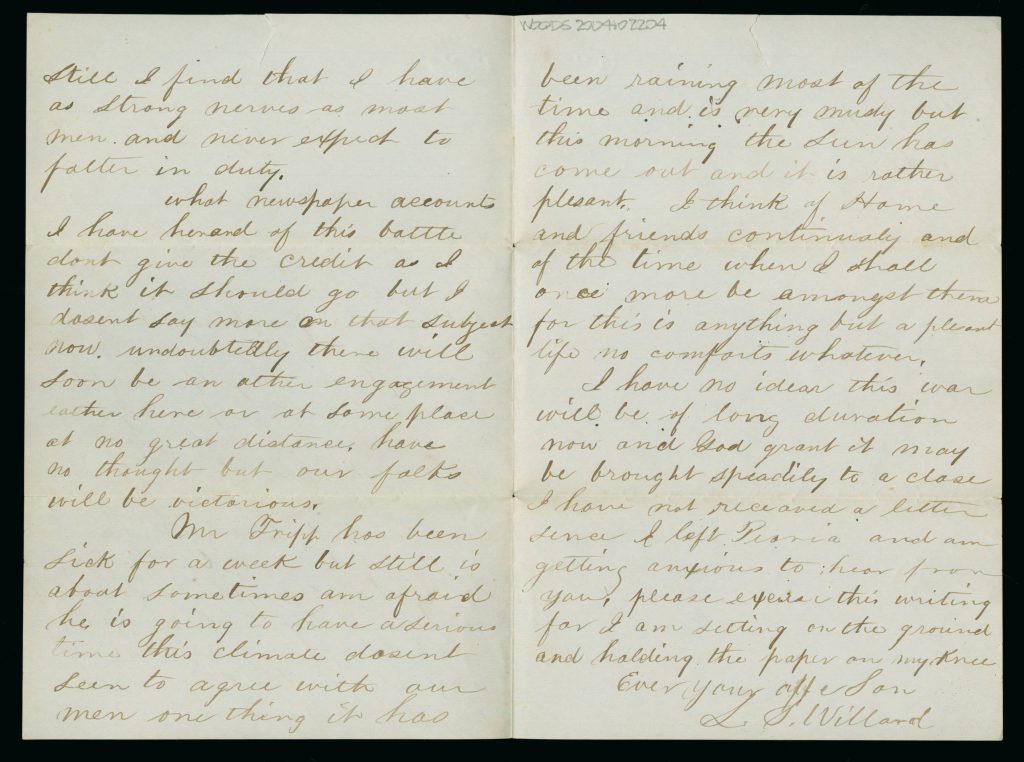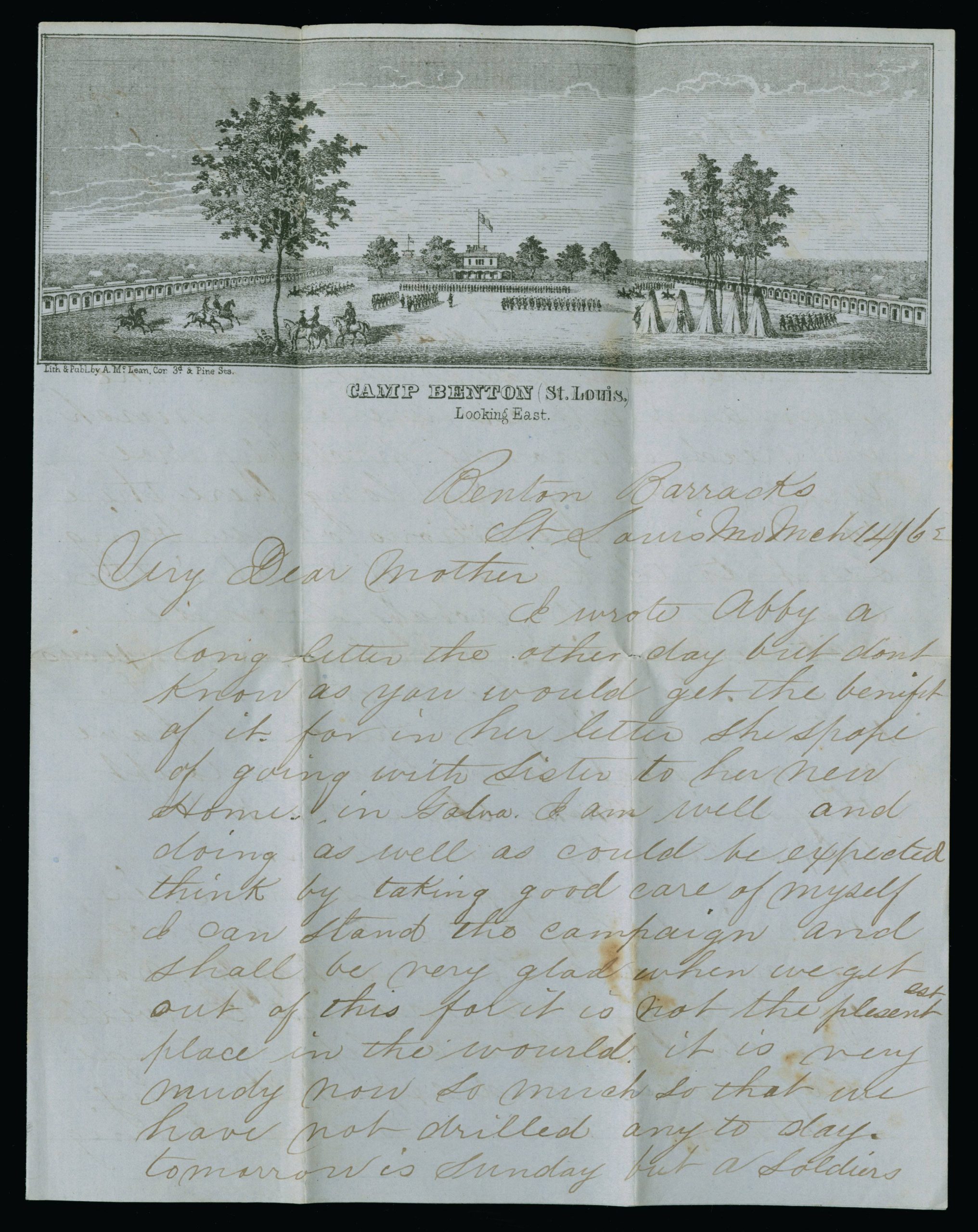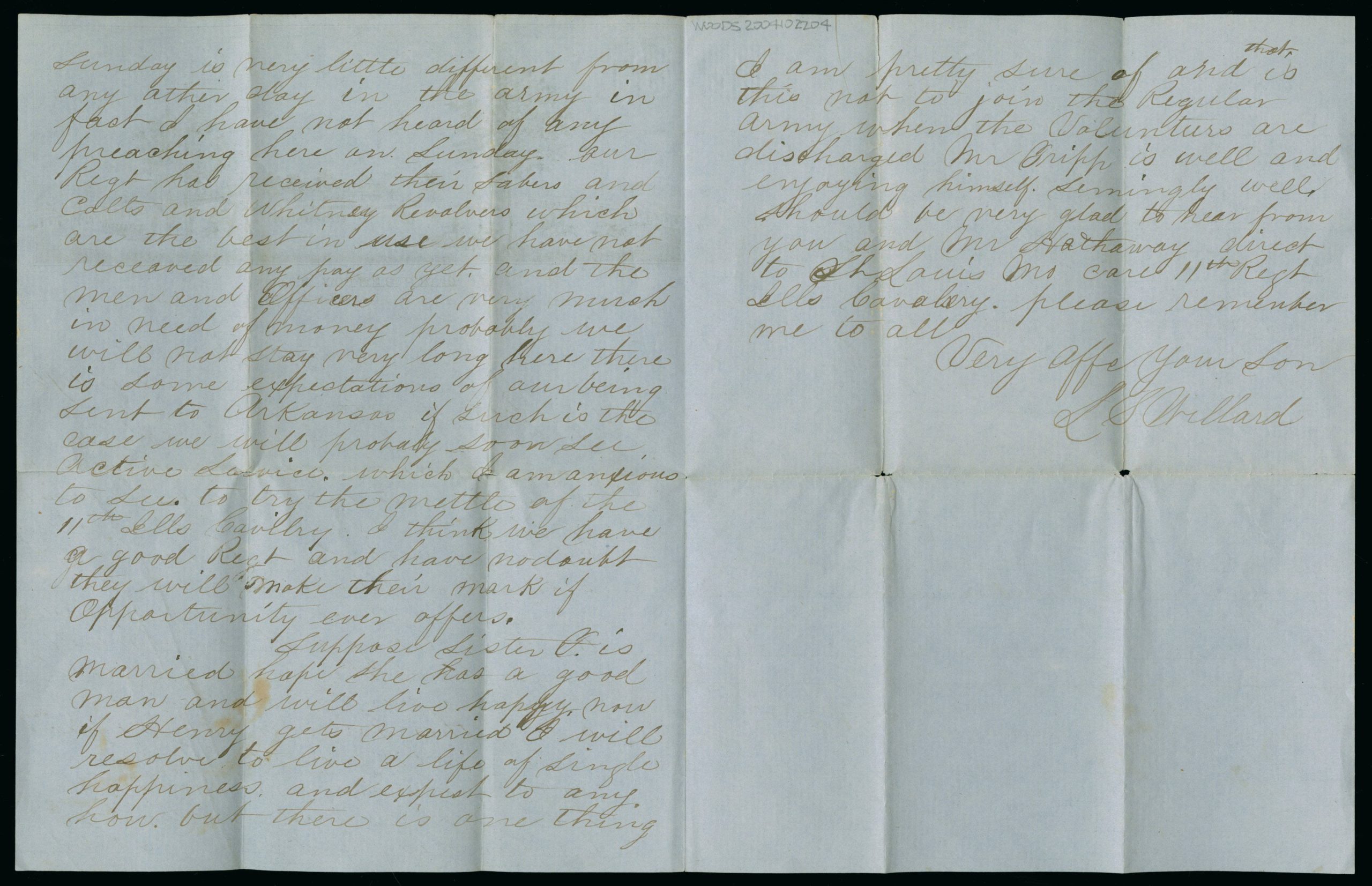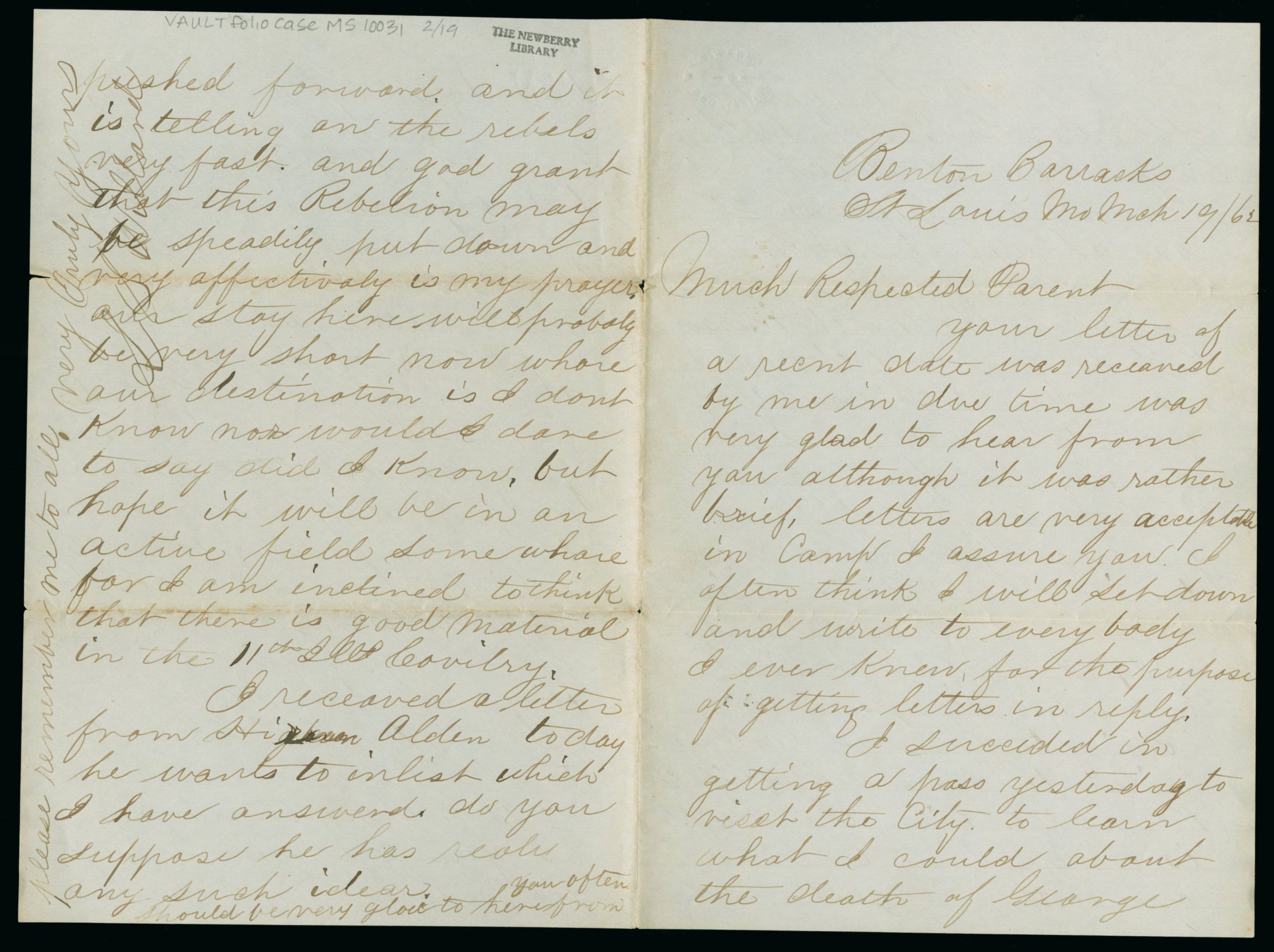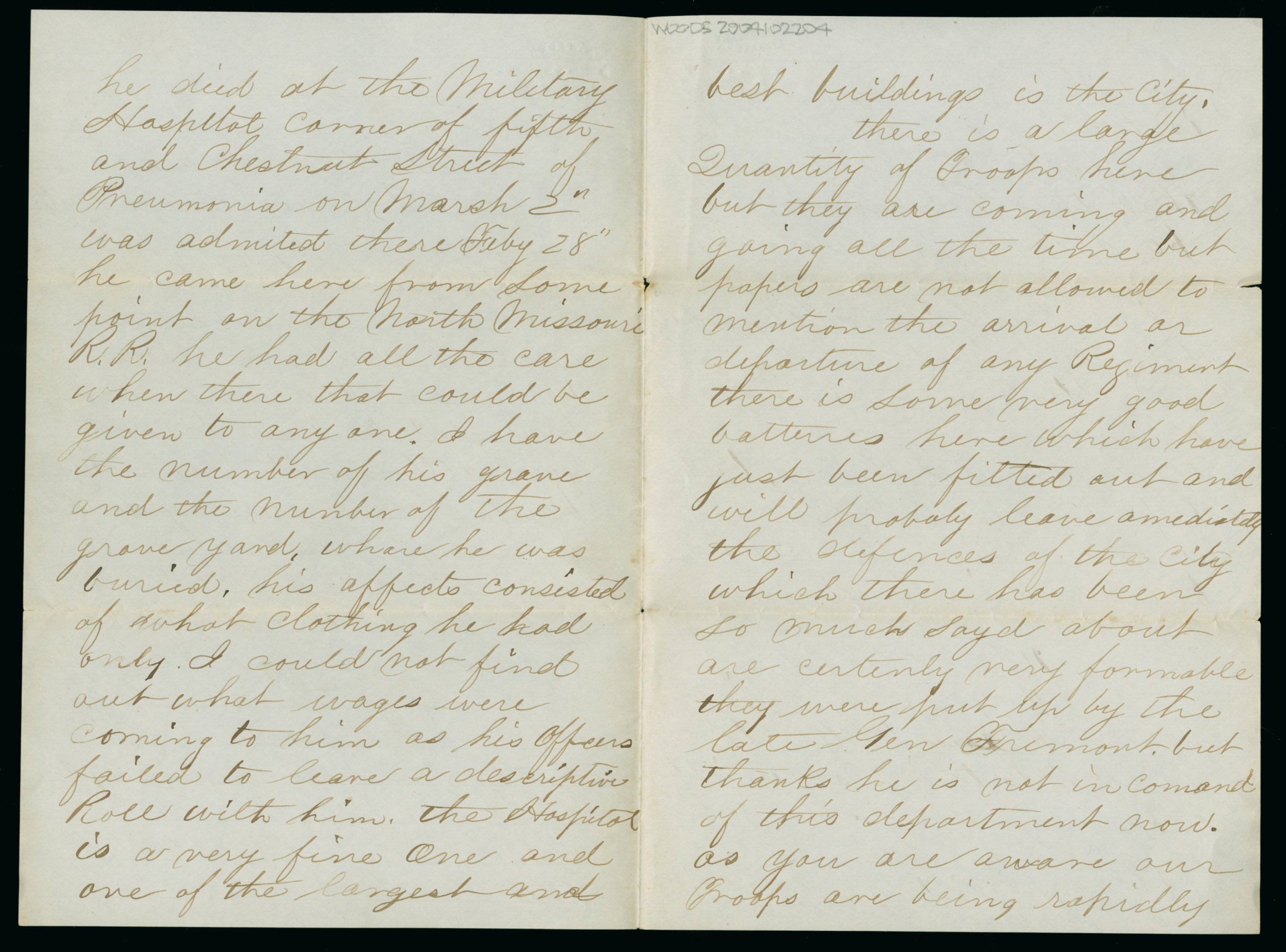Topics
Battle of Shiloh
Soldiers’ Experiences
Period
US Civil War
Skills & Document Types
Close Reading
Letters
This activity is intended for less advanced students than the accompanying lesson plan.
Materials – Documents available for download in the Downloads Tab:
- Computer and projector
- A copy of the “Civil War Letters” activity
- Transcriptions of the sources
- Images of the original sources (high-resolution versions linked below)
Process
This activity can be used as an introduction to a unit on the Civil War or as part of a lesson on the Battle of Shiloh or other major battles of the war. It can also be used as part of instruction on historiography, close reading, and how to gather information from a primary source. You may want to review the Skills Lesson: Reading a Transcription with students.
Display the letter and its transcription. Give students time to generate and answer questions about it and write notes. Use the background material at the end of this activity whenever you think it will encourage students to ask more questions and think more about how to engage with the letter.
Click the images below for high resolution versions you can display for your class.
Transcription
direct your letters care 11th Regt Ills cavalry Gen Grants Devision West Tenn Pittsburg Penn Sunday April 13 1862
Dear Mother + Father one week ago this morning commenced one of the most terriable battles ever fought on this continent I wrote to Wm amediately that Mr. Tripp and myself were safe and ask him to inform you as soon as possiable. supposing you might feel some alarm before this you have got full accounts of it and I have no heart to describe the fearful scean the slaughter was dreadful on both sides such as I never want to behold nor have I any desire to see another battle hope I may not
Still I find that I have as strong nerves as most men and never expect to falter in duty. what newspaper accounts I have heard of this battle dont give the credit as I think it should go but I dosent say more on that subject now. undoubtedly there will soon be an other engagement eather here or at some place at no great distance. have no thought but our folks will be victorious. Mr Tripp has been sick for a week but still is about sometimes am afraid he is going to have a serious time this climate dosent seem to agree with our men one thing it has been raining most of the time and is very mudy but this morning the sun has come out and it is rather plesant. I think of Home and friends continualy and of the time when I shall once more be amongst them for this is anything but a plesant life no comforts whatever. I have no ideas this war will be of long duration now and God grant it may be brought speadily to a close I have not receaved a letter since I left Peoria and am getting anxious to hear from you, please excuse this writing for I am sitting on the ground and holding the paper on my knee. Ever your affc Son L.S. Willard
Potential Inquiry Questions
- When and where was this letter written?
- Who wrote this letter? Who is the letter written to? Why was it written?
- In a sentence or two, explain what this letter is about. What is its main point?
- What can you determine about the writer based on his letter? How did you come to that conclusion?
- Where is the letter writer from? How do you know?
- What does this letter tell you about the Civil War? What does it tell you about being a soldier?
- Think about what you already know about the Civil War. Does this letter challenge or confirm what you know?
- What are some other details in this letter? What other questions does this letter inspire? What else do you want to know after reading it, and how could you find that information?
Background
Lot Sabine (L.S.) Willard was a first lieutenant in the 11th Illinois Calvary, Company G. He enlisted in the U.S. Army at age 22 on December 20, 1861. Nineteen of the letters that he wrote to his mother, father, and brother during his time in the Union Army were saved and made part of the L.S. Willard letters collection at the Newberry. The money that Willard earned being a “traveling agent” in his hometown of Peoria, Illinois, allowed him to enter the war as a first lieutenant. He was initially eager to experience active service, but changed his mind after his regiment’s first fight, the Battle of Shiloh. This letter was written just after the battle which came to haunt him for years afterward. Willard became a major and senior aide-de-camp to General James B. McPherson on April 18, 1863. He camped in Vicksburg, and then marched with Sherman and fought at Resaca and Kennesaw Mountain. Willard survived the war and was mustered out on August 9, 1864. He then settled down in Illinois and began raising a family. In 1870, he was a dry goods merchant living in Illinois with his wife Ellen, his children William and May, and a domestic servant. He had accumulated $6,000 worth of property. Within ten years, Willard moved to Minnesota and his family grew with the addition of a third child, Asa.
Learn more here.
Extension Activity
Instead of giving students the information about Willard’s post-Civil War life provided above, have students do their own research to find out more about Willard’s life both before and after the Civil War. Go to Family Search, a free site (familysearch.org), and search for his name. You will have to create an account with Family Search in order to access their records.
Additional Resources
- L.S. Willard Letters, Newberry Library. Nineteen Letters from Lot Sabin Willard to his mother, father, and brother in Peoria, Illinois during the Civil War, from 1862-1864.
- L.S. Willard collection description, Newberry Library.
- “Battle of Shiloh,” Shiloh National Military Park, National Park Service.
- Letters and the Postage Service During the Civil War, National Postal Museum.
Letters from the L.S. Willard Letters Collection
Topics
Battle of Shiloh
Soldiers’ Experiences
Periods
US Civil War
Skills & Document Types
Close Reading
Letters
This lesson is intended for more advanced students than the accompanying activity.
Materials – Documents available for download in the Downloads Tab:
- Computer and projector
- A copy of the “Civil War Letters” lesson
- Transcriptions of the sources
- Images of the original sources (high-resolution versions linked below)
- Student worksheet for this lesson
Process
You and your students are going to read two or three letters by L.S. Willard. Willard wrote these letters to his family back home at the beginning of the Civil War, after he was in the Battle of Shiloh.
This lesson is for a teacher-controlled class. If you would like your students to work with the source independently or in small groups, there is a link above for the Student Worksheet. The lesson can be taught in a variety of ways depending upon the time available. You could start by showing the original letters or simply focus on the transcriptions. You may want to review the Skills Lesson: Reading a Transcription with students. You can also focus on only the first and last letters or spend more time and explore all three.
Examining the Originals
Starting with the original letters is a way to help students see how historians work and why they have to be able to read cursive writing in order to explore the past. Display the first original letter or choose a different one from below. Explain or display for students how letters were written on a folded piece of paper so that they will understand how the original letters are laid out.
Zoom in on the letter and have students try to decipher the text. Discuss how difficult or easy it is to read the letters. Have students examine the handwriting and stationery of each letter and note any differences between them. Students might point out that the first letter is on stationery and the second two are on plain paper, that the lines are mainly straight despite there being no lines on the paper, that the handwriting is fairly neat throughout and there are very few cross outs or last-minute additions. Students will also probably notice unusual punctuation, spelling, and abbreviations. Consider having students create lists of words and phrases that are unfamiliar and research what they mean. Upper-level students could even do research on whether a word is misspelled or whether the spelling has changed since the 1860s.
Reading the Letters
Explain to students that the typed excerpts are transcriptions of handwritten letters. They can see images of the original letters below the transcriptions. Download transcriptions of these letters and copies of the originals in the Downloads tab.
Letter 1, March 14, 1862
In groups or individually, have the class read the first letter. Initially, do not provide them with any background information.
Ask students to note everything they can about the writer of the letter, any questions they have about it, and any suppositions they can make based upon their own knowledge of history. If necessary to prompt them, ask questions such as the ones below. If students do not point it out themselves, make sure to point out the line “probably soon see Active Service which I am anxious to see to try the mettle of the 11th Ills Cavilry.”
Transcription
Benton Barracks
St Louis, Mo Mch 14 | 62Very Dear Mother
I wrote Abby a long letter the other day but dont know as you would get the benefit if it. for in her letter she spoke of going with Sister to her new Home in Galna[?]. I am well and doing as well as could be expected think by taking good care of myself I can stand the campaign and shall be very glad when we get out of this for it is not the pleasantest place in the wourld. it is very mudy now so much so that we have not drilled any to day. tomorrow is Sunday but a Soldiers Sunday is very little different from any other day in the army in fact I have not heard of any preaching here on Sunday. Our Regt has received their sabers and colts and Whitney Revolvers which are the best in use we have not received any pay as yet. And the men and Officers are very much in need of money probably we will not stay very long here there is some expectations of our being sent to Arkansas if such is the case we will probably soon see Active Service which I am anxious to see to try the mettle of the 11th Ills Cavilry. I think we have a good Regt and have no doubt they will make their mark if Opportunity ever offers.
Suppose Sister O.[?] is married hope she has a good man and will live happy. now if Henry gets married I will resolve to live a life of Single happiness. And expect to any how. but there is one thing I am pretty sure of and that is this not to join the Regular Army when the Volunteers are discharged Mr Tripp is well and enjoying himself seemingly well. should be very glad to hear from you and Mr Hathaway
direct to St. Louis Mo care 11th Regt Ills Cavalery. please remember me to all
Very Affc Your Son
LS Willard
Potential Questions
- When and where was this letter written?
- Who wrote this letter? Who is the letter written to? Why was it written?
- What can you determine about the writer based on his letter? How did you come to that conclusion?
- What do you not know about the letter-writer? What questions do you have about him and what happened to him?
- What does your background knowledge of the Civil War and the nineteenth century United States tell you about the letter-writer and his experience?
- Is the writer looking forward to battle or not? Why or why not? How do you know?
Does anything in this letter surprise you? - What questions does reading this letter raise?
Letter 2, March 19, 1862
After the class has considered the first letter, have them read the second. Have students note what new information this letter provides and whether it inspires new questions. If necessary, help students see that Willard seems lonelier and/or more homesick (his lines about wanting more letters from home) and point out that the way George has died aligns with the fact that many of the casualties of the Civil War were caused by illness and disease rather than death in battle.
Transcription
Benton Barracks
St Louis, Mo Mch 19 | 62
Much Respected Parent
Your letter of a recnt date was receaved by me in due time was very glad to hear from you although it was rather brief, letters are very acceptable in Camp I assure you. I often think I will sit down and write to everybody I ever knew for the purpose of getting letters in reply.I succeeded in getting a pass yesterday to visit the City to learn what I could about the death of George he dies at the Military Hospital corner of fifth and Chestnut Street of Pneumonia on Marsh 2nd was admited there Feby 28th he came here from some point on the North Missouri R.R. he had all the care when there that could be given to anyone. I have the number of his grave and the number of the graveyard where he was buried. his affects consisted of what clothing he had only. I could not find out what wages were coming to him as his Officers failed to leave a descriptive Roll with him. the Hospital is a very fine one and one of the largest and best buildings is the City.
there is a large Quantity of Troops here but they are coming and going all the time but papers are not allowed to mention the arrival or departure of any Regiment there is some very good batteries here which have just been fitted out and will probably leave amediately the defences of the city which there has been so much sayd about are certenly very formable they were put up by the late Gen Fremont but thanks he is not in comand of this department now. as you are aware our Troops are being rapidly pushed forward and it is telling on the rebels very fast. and god grant that this Rebelion may be speadily put down and very affectively is my prayer. our stay here will probably be very short now where our destination is I don’t know. but hope it will be in an active field some where for I am inclined to think that there is good material in the 11th Ills Cavilry.
I received a letter from Hiram[?] Alden today he wants to inlist which I have answered. do you suppose he has [illegible] any such idear.
Should be very glad to here from you often. Please remember me to all.
Very Truly Yours LS Willard
Potential Questions
- When and where was this letter written?
- Does this letter tell you anything new about Willard or the war?
- Has anything changed about Willard? Does the letter reveal anything about how he is feeling? Does he feel differently about the war or his role?
- Has Willard changed his opinion about battle or not? Why or why not? How do you know?
- Does anything in this letter surprise you?
- Does this letter answer any of your questions? Does it raise new questions?
Letter 3, April 13, 1862
Finally have the class read the third letter. Have students note what new information this letter provides and whether it inspires new questions. If necessary, help students see that Willard’s understanding of war has changed now that he has actually experienced a battle.
Transcription
direct your letters care 11th Regt Ills cavalry Gen Grants Devision West Tenn Pittsburg Penn Sunday April 13 1862
Dear Mother + Father one week ago this morning commenced one of the most terriable battles ever fought on this continent I wrote to Wm amediately that Mr. Tripp and myself were safe and ask him to inform you as soon as possiable. supposing you might feel some alarm before this you have got full accounts of it and I have no heart to describe the fearful scean the slaughter was dreadful on both sides such as I never want to behold nor have I any desire to see another battle hope I may not
Still I find that I have as strong nerves as most men and never expect to falter in duty. what newspaper accounts I have heard of this battle dont give the credit as I think it should go but I dosent say more on that subject now. undoubtedly there will soon be an other engagement eather here or at some place at no great distance. have no thought but our folks will be victorious. Mr Tripp has been sick for a week but still is about sometimes am afraid he is going to have a serious time this climate dosent seem to agree with our men one thing it has been raining most of the time and is very mudy but this morning the sun has come out and it is rather plesant. I think of Home and friends continualy and of the time when I shall once more be amongst them for this is anything but a plesant life no comforts whatever. I have no ideas this war will be of long duration now and God grant it may be brought speadily to a close I have not receaved a letter since I left Peoria and am getting anxious to hear from you, please excuse this writing for I am sitting on the ground and holding the paper on my knee. Ever your affc Son L.S. Willard
Potential Questions
- When and where was this letter written?
- Does this letter tell you anything new about Willard or the war?
- What has happened to Willard since the last letter he wrote? Has anything changed about him as a result?
- Does he feel differently about the war or his role? Why or why not? How do you know?
- Does anything in this letter surprise you?
- Does this letter answer any of your questions? Does it raise new questions?
- Where might you find information to help you answer any of the unanswered questions raised by these letters?
Background
Lot Sabine (L.S.) Willard was a first lieutenant in the 11th Illinois Calvary, Company G. He enlisted in the U.S. Army at age 22 on December 20, 1861. The money that he earned being a “traveling agent” in his hometown of Peoria, Illinois, allowed him to enter the war as a first lieutenant. He was initially eager to experience active service, but changed his mind after his regiment’s first fight, the Battle of Shiloh. This battle came to haunt him for years afterward. Willard became a major and senior aide-de-camp to General James B. McPherson on April 18, 1863. He camped in Vicksburg, and then marched with Sherman and fought at Resaca and Kennesaw Mountain. Willard survived the war, and was mustered out on August 9, 1864. He then settled down in Illinois and began raising a family. In 1870 he was a dry goods merchant living in Illinois with his wife Ellen, his children William and May, and a domestic servant. He had accumulated $6,000 worth of property. Within ten years, Willard moved to Minnesota and his family grew with the addition of a third child, Asa.
Learn more here.
Extension Activities
- Extend the lesson by having students compare the letters in this lesson to those in another lesson, Amy Eleanor Wingreen Letters. Wingreen, a nurse from Chicago, Illinois, served in Cuba during the Spanish American War. Have students consider similarities and differences between Wingreen’s and Willard’s experiences and how their perceptions of war changed before and after they experienced battle.
- Have students look at some of the other letters in the L.S. Willard collection and report back to the class what they have learned.
- Rather than giving students with the information about Willard’s post-Civil War life provided above, have students do their own research to find out more about Willard’s life both before and after the Civil War. Go to Family Search, a free site (familysearch.org) and search the 1880 Census. You will have to create an account with Family Search in order to access their records. The subscription site Ancestry.com, available through many public libraries, offers even more results.
Words to Know
Transcription │ the typed text of a handwritten document or an audio recording
See the Skills Lesson “Reading a Transcription” here.
Additional Resources
- L.S. Willard Letters, Newberry Library. Nineteen Letters from Lot Sabin Willard to his mother, father, and brother in Peoria, Illinois during the Civil War, from 1862-1864.
- L.S. Willard collection description, Newberry Library.
- “Battle of Shiloh,” Shiloh National Military Park, National Park Service.
- Letters and the Postage Service During the Civil War, National Postal Museum.
Letters from the L.S. Willard Letters Collection
Download the following materials below:
- A copy of the “Civil War Letters” lesson
- A copy of the “Civil War Letters” activity
- Images of the original sources
- Transcriptions of the sources
- Student worksheet for this lesson



